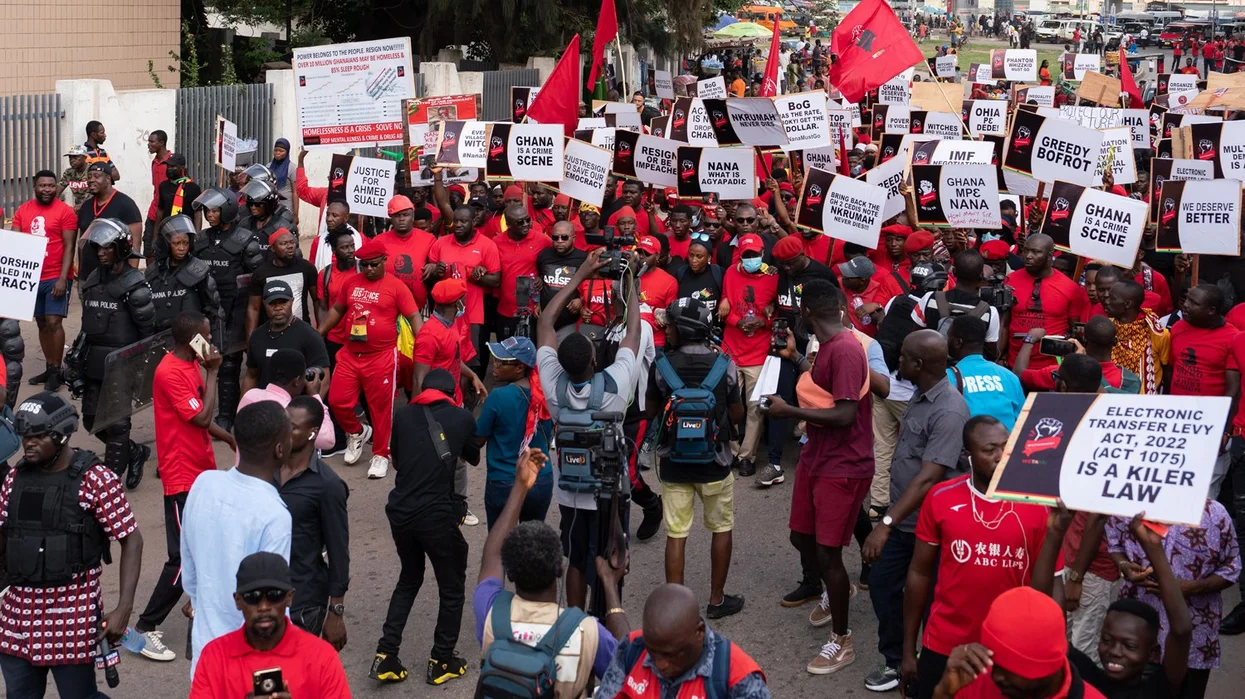Ghana Protests for Accountability Amidst Economic Turmoil
Ghana Protests for Accountability Amidst Economic Turmoil
The Historical Significance of September 21st
Back in 2009, John Evans Atta Mills, the late president of Ghana, declared September 21st a statutory holiday in honor of Kwame Nkrumah, one of the nation's founding fathers. However, in recent times, this date has taken on a different significance as Ghanaians voice their concerns about various societal and political issues plaguing the nation.
#OccupyJulorBiHouse: A Cry for Change
As hundreds of Ghanians took to the streets, others utilized their social media presence to spread the word of the protests and raise awareness against the country's callous governance with #OccupyJulorBiHouse. Ghanaian sports Journalist, Gary Al-Smith shares, “The hashtag is a play on Occupy and Jubilee House (Ghana’s seat of government). Julor Bi is a Ga (language of the people of Accra, Ghana’s capital) phrase meaning ‘Child of a Thief,’ a loose reference to the ruling Executive, who the people believe have negligently driven the country into a mess.”
The Lead-Up to the Protests
On Tuesday, September 19, Democracy Hub held a press conference to inform members of the public the necessary measures being adopted to ensure their safety and success of the demonstration. The protest schedule planned to hold for a three-day period at Jubilee House and the organizers all logistical arrangements had been made for any protesters who planned on camping outside the government office. The following day, the police made attempts to foil all plans made towards the peaceful protest with an issued statement claiming they received a court order to cancel the demonstration.
Police Opposition and Legal Hurdles
Signed by the Juliana Obeng, the press release read, “As we wait for the court to determine the matter, we wish to urge the public to take note and disregard any calls from any individuals or groups encouraging them to assemble for demonstration at the Jubilee House.” The statement concluded with a direct address to Democracy Hub, “We equally wish to urge the organizers to respect the due process in the interest of public order and public safety.”
Peaceful Gathering Turns Confrontational
Nonetheless, protesters gathered peacefully at the seat of government the next day in a bid to hold the government accountable for their actions, only to be met by aggressive police resistance. As participants voiced their grievances regarding several injustices and the hardships faced by Ghanaians on a daily basis, reports share that the police arrested 49 protesters to be held at the Accra Regional Command Barracks. The arrested parties include any onlookers dressed in black and red—colors associated with anti-government—whether or not they’re participating in the protest. Several journalists, including two from BBC were also detained and have since been discharged.
Legal Response and Public Backlash
A new police report titled ‘POLICE ARREST 49 SUSPECTS FOR UNLAWFUL ASSEMBLY AND VIOLATION OF PUBLIC ORDER ACT’ claimed the arrested protesters were guilty of “the flagrant disregard of a court process.” As a result, many participants took to social media to flag the arrest as an infringement of several constitutional human rights. To this, the Ghanaian police service explained that they’re not opposed to any peaceful demonstration; however, “The exception, in this case, is the Police disagreement with the organizers on the venue, the Jubilee house, being a security zone.”
Economic Woes and Government Accountability
According to NPR, spokespersons for President Akufo-Addo attributed Ghana's economic challenges to the COVID-19 pandemic and Russia's invasion of Ukraine, which have contributed to rising inflation worldwide. However, the protests had been brewing for some time due to the government's mismanagement of funds. Many protesters pointed to the 17th financial rescue from the International Monetary Fund, involving a $3 billion bailout loan signed in May. Others expressed dissatisfaction with extravagant and seemingly unnecessary expenses, such as the construction of a new, 5,000-capacity national cathedral, costing over $400 million.
Raise Awareness and Support
Join the Movement
You can share this news post or any related information about the protests on your social media accounts using the #OccupyJulorBiHouse hashtag. Additionally, please consider sharing resources that may be helpful to concerned parties seeking to understand the situation better and support the cause. Together, we can shed light on the issues affecting Ghana and demand accountability from the government.
Conclusion
In conclusion, the protests in Ghana represent a call for transparency, accountability, and a better future for the nation. Ghanaians are uniting to demand change, and their voices are being heard around the world. As the situation unfolds, it remains to be seen how the government will respond to these calls for reform.

